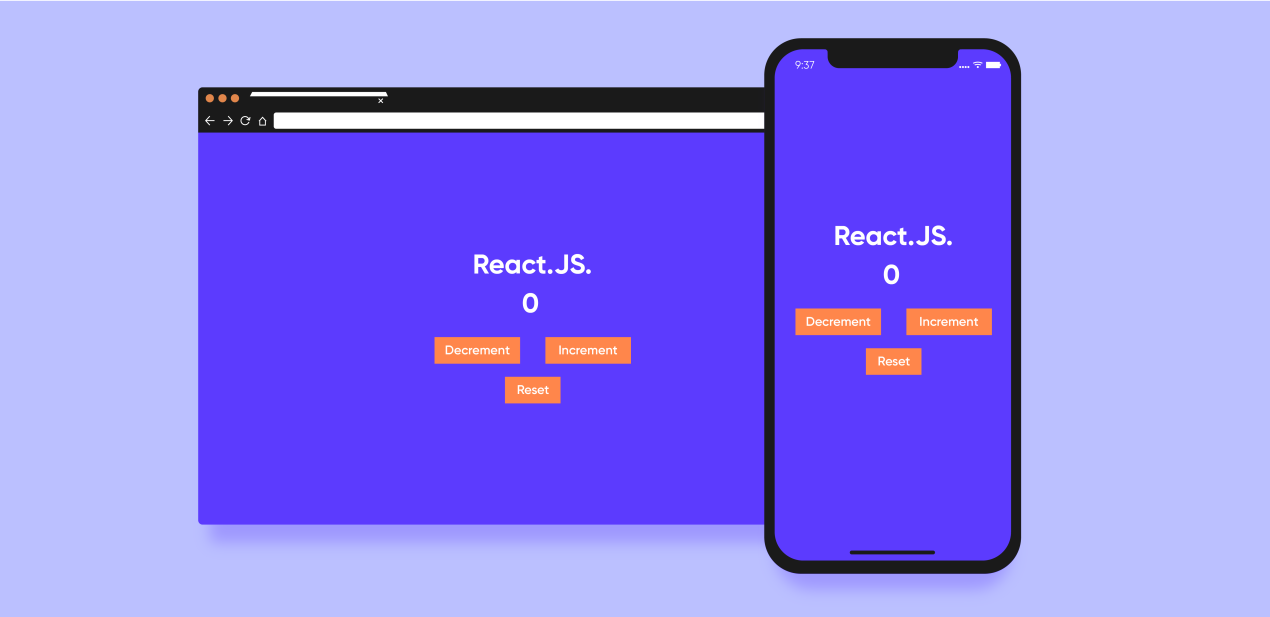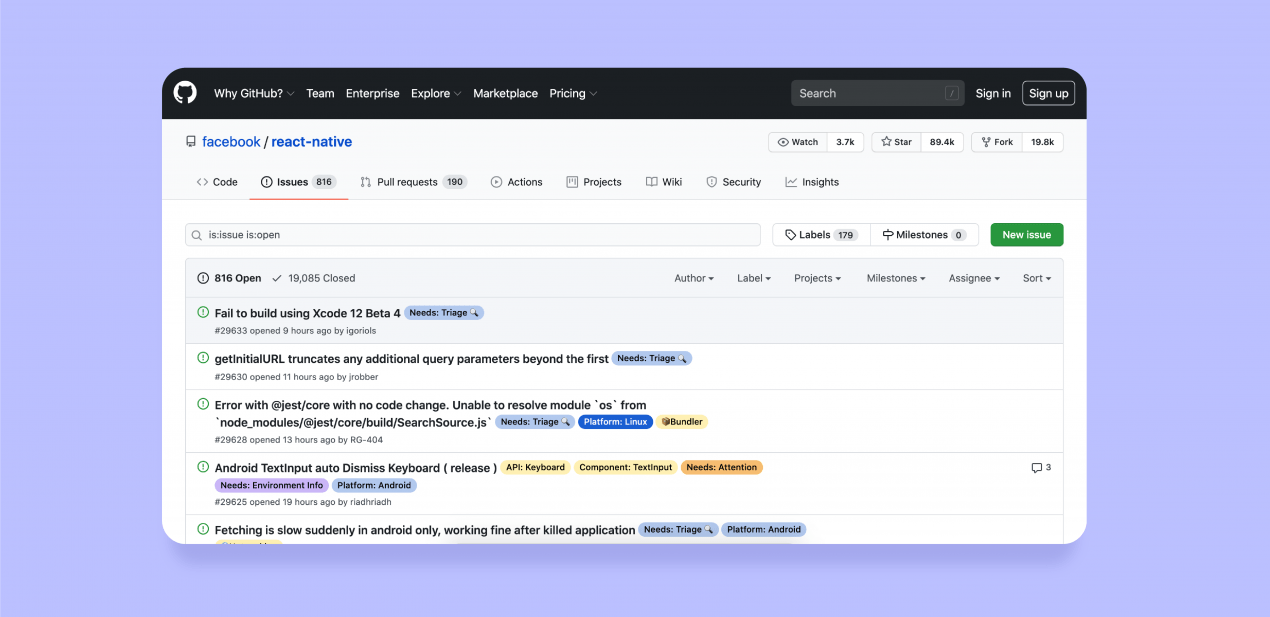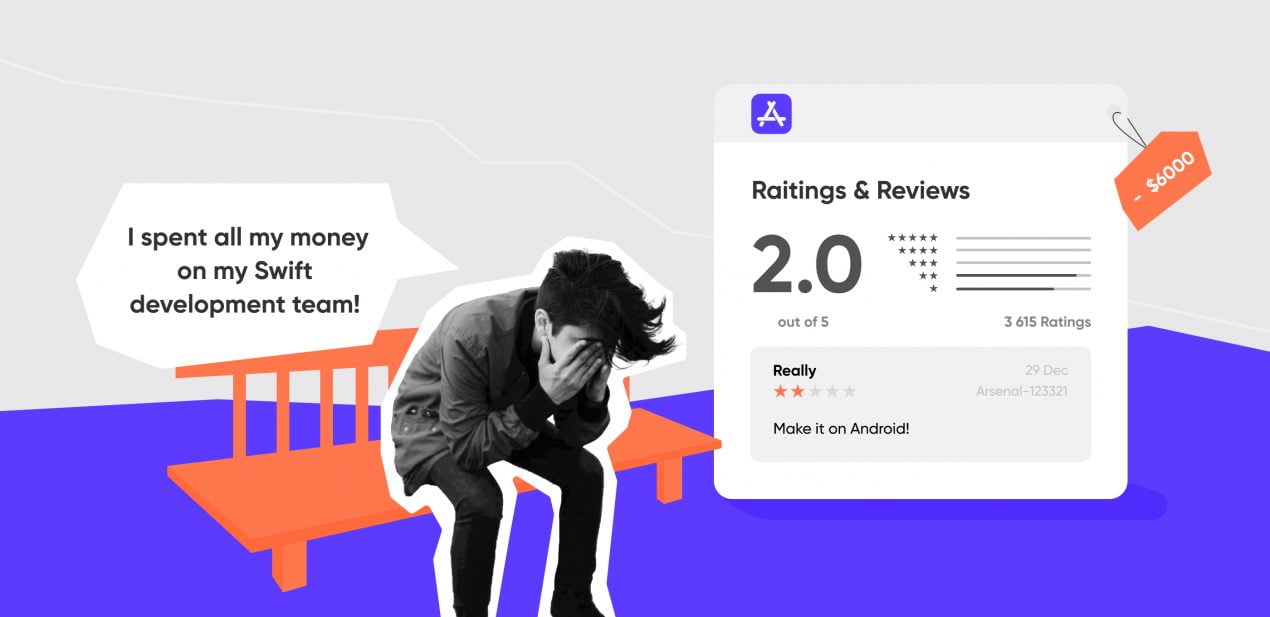React Native is a mobile application development JavaScript-based framework, developed by Facebook, Inc. It is an open-source cross-platform tool that uses React and native platform capabilities to create mobile applications. It also uses declarative components to create the UI for the app you’re working on. Trying to find an agency that will handle both development and React Native app design may be a difficult yet realistic objective.
At the moment, React Native is the most popular cross-platform mobile framework, used by around 42% of developers. Multiple tech giants and successful companies in other fields of expertise have chosen this platform to create their mobile applications. Instagram, SoundCloud, Bloomberg, Discord, and even Walmart have built their apps with React Native. The question is, why mobile development with React Native is so popular and trustworthy?
As every software development technology, React Native mobile development has its pros and cons. However, the advantages it presents for cross-platform design way outweigh the challenges you might face. Let’s take a closer look at what makes it so great.
Benefits of React Native Mobile App Development
1. Short Development Time
One of the main goals of React Native creation was to accelerate and reduce the cost of mobile app development. In order to achieve the goal, they made it possible to reuse UI elements by applying components and libraries.
React Native developers have created some of the most helpful, stylish, and time-saving component libraries with comprehensive documentation, and in some cases — even full application templates. The most popular ones include NativeBase, React Native Elements, and React Native Starter Kit.
Another more obvious reason why React Native is great for mobile development is that it saves development time with its cross-platform capabilities.
2. Effortless Cross-Platform Development
Most of the code you write with React Native can be used both for Android and iOS applications. For example, Facebook claims that they reuse around 87% of its code on both platforms. However, for a simpler application, it would be possible to push this number even higher, in some cases up to full 100%.
What’s great about that is such simplicity not only keeps the development process effortless, it also eases up the maintenance. The React Native development team won’t have to fix mistakes on two separate app versions, any update would be able to be published for both platforms, there would be less platform-specific challenges. So yes, this is another advantage of React Native mobile development.
3. Easy to Learn and Use
Some principles of React Native development are virtually identical to the React development. This means that for frontend developers, familiar with React, it would be easy to learn and use its mobile cross-platform sibling. Choosing React Native for mobile app development may be also beneficial for you since React Native is also equipped with comprehensive documentation, which makes development even easier for beginners.
 React.JS for web apps, React Native for mobile apps
React.JS for web apps, React Native for mobile apps
It is also possible to blend React Native apps with platform-specific languages. It is both useful for situations when the developer is more familiar with Swift or Java, or if you want to use a third-party component, written in one of these languages.
4. React Native High Performance
Performance is an important point that contributes to the success of an application. Fortunately, React Native offers native-like performance. In most cases, it acts the same as an app written on Java or Swift. However, in addition to great performance, React Native provides multiple other benefits the native apps do not have.
This benefit of using React Native app development services is especially noticeable when compared to apps written with other cross-platform technologies. It is achieved by using the asynchronous bridge that connects the JavaScript code and native components. Of course, there are some limitations and challenges connected to React Native app performance (like navigation and memory leakage issues), but there are also tricks and solutions to them.
5. Flexible for Better Teamwork
One of the best benefits of using React Native for mobile development for the developers is its intuitive interface and modular architecture. Basically, an application can be separated into modules that are independent and interchangeable. This means that separate developers and development teams can work on different app components at the same time.It also makes it easier for new team members to catch up and get into work.
Such flexibility also extends to QA testers. It is easier for them to create certain scenarios and to check, which part of the application is actually responsible for the problem for a quicker fix.
6. Updates and Augmentations of the Final Product
App development is often a constant, never-ending process, with a constant need for bug fixes and updates. React Native makes this process easier with its useful Over-the-Air update feature. For the changes made in the JavaScript part of the app, it allows developers to streamline the update process directly to the users’ devices, without a need to update them through Apple Store or Play Store.
This gives React Native apps a huge edge over the native ones. React Native provides the best traits of web apps (like an easy and straightforward update process) and native apps (great performance and broad range of capabilities) without their disadvantages.
7. Active and Helpful Community
As we’ve already mentioned, most mobile developers are using React Native in some capacity. So, how can that be an advantage for you?
Go ahead and check the full list of React Native communities
First of all, an active community of React Native ensures that any questions you might have about the framework would be answered quickly and correctly. And React Native community is definitely active with the second-highest number of contributors (more than 10000) for a repository on Github. And it is not the only place to learn — you can turn to Facebook groups for discussion and educational resources like Udemy, or even Youtube. Just try searching for ‘React Native’. 🙂
Not only that, but React Native developers are also always adding more new custom components that can help you in the React Native mobile development process.
So what do we have?
React Native is a versatile tool that provides a lot of benefits for cross-platform app development. React Native mobile development = less time, money, and other resources spent. By being easy to use, flexible, requiring no additional tweaks for each platform and supporting native additional code, React Native is great.
What’s also great about React Native mobile development is that it is suitable for most projects. Unless you have in mind a graphics-heavy application that requires as good performance as possible, you’re good to go. Be it a food delivery app or a marketplace, React Native is the tool to choose.












